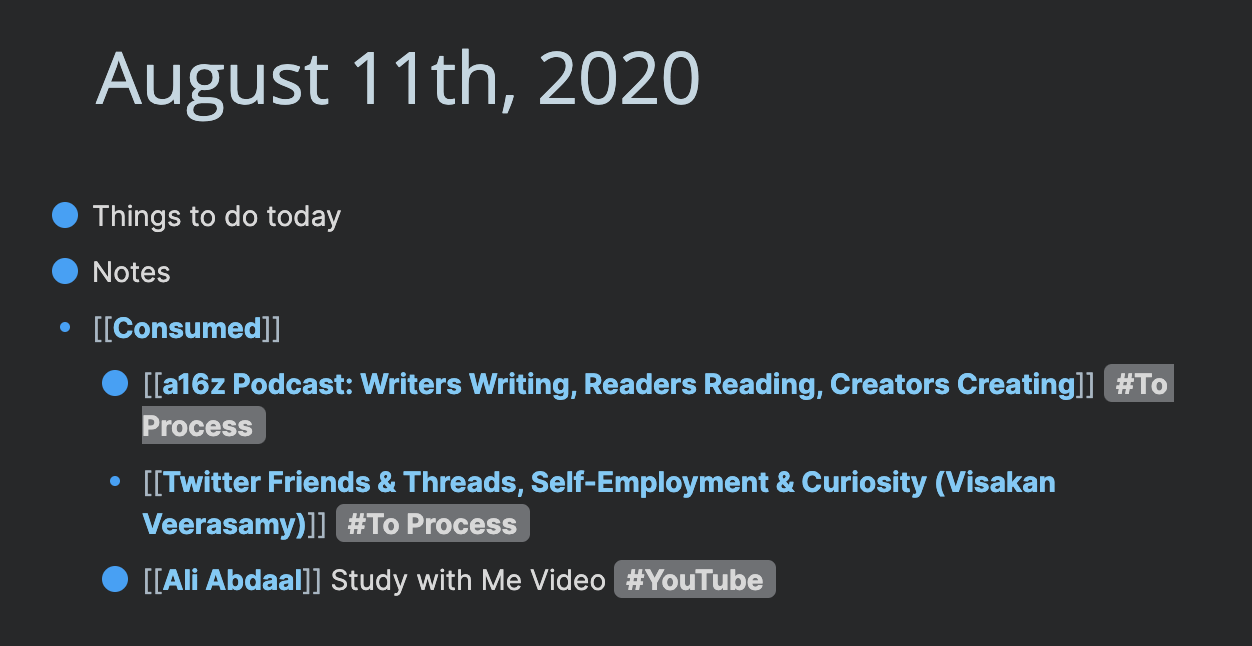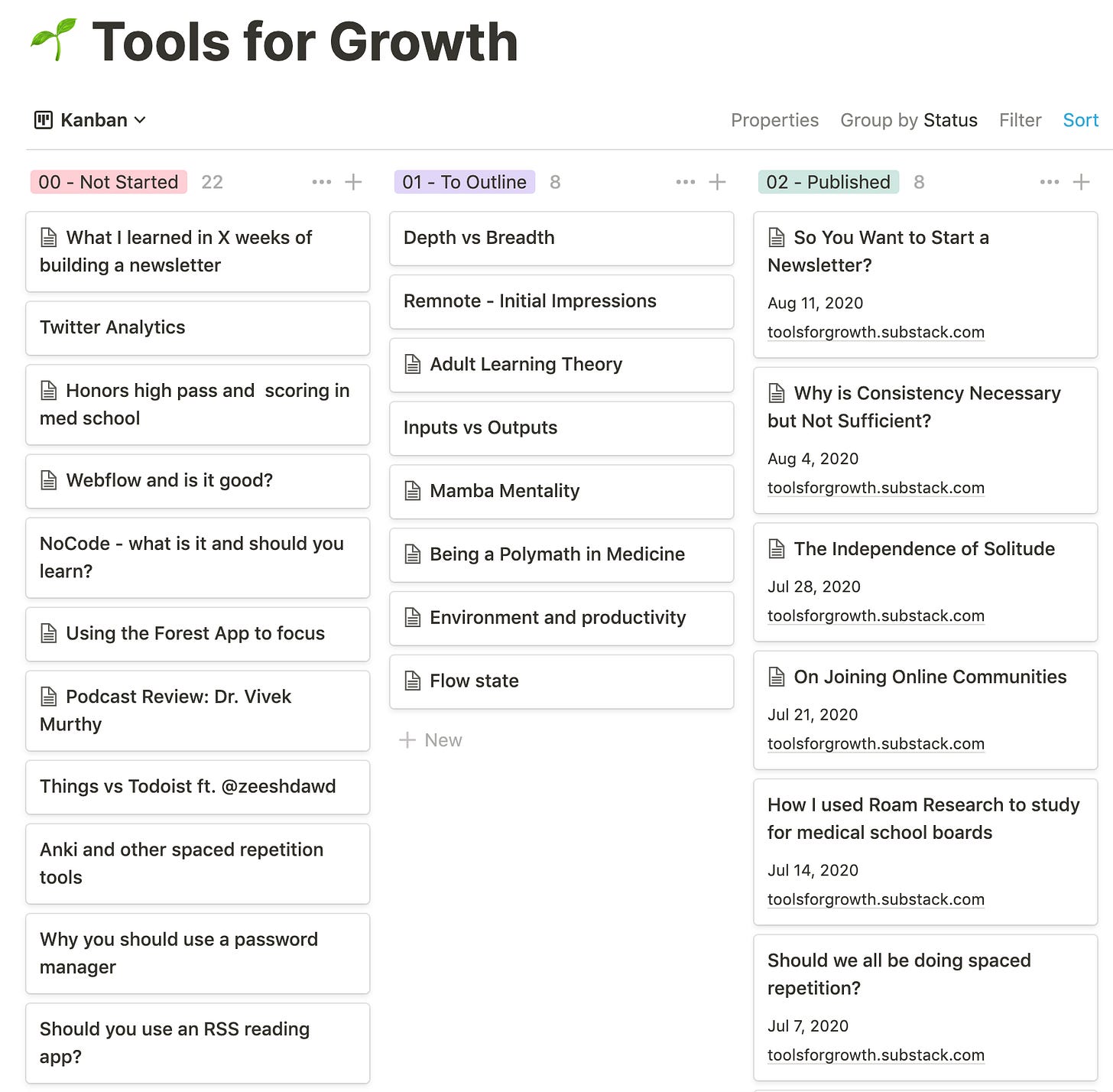How to Survive the Age of Information Exhaustion
Finding a balance between inputs and outputs.
Hey friends - If you like what you read below and want to chat about it, I'd love for you to shoot me a message on Twitter. You can find me @akiffpremjee
I have a problem.
I read and watch too many things online. And I'm sure you do too. It's 2020 and we are in the Age of Information Overload. Actually, according to Tiago Forte, we are in the Age of Information Exhaustion.

What does this mean? Basically it means that we have more information to take in now than we ever have before. I'm not just talking about blog posts, news articles, tweets, and tiktoks. This also includes email, contracts, memos, text messages, and hospital electronic medical records (if you're me).
Taking in large volumes of information is the new norm. We're expected to do it and because everyone is doing it, no one questions it. However, it is leading us to feel overwhelmed by all that we have to take in, and, moreover, it is preventing us from creating output and thinking critically about what we are consuming.
In today's newsletter, I want to unpack the balance between Inputs and Outputs and why we need to be more deliberate about creating more than we consume. I also want to leave you with some practical systems for how you can do this. Let's get into it.
The need for balance
There is no shortage of content to consume today. News sites are updating us with breaking news every few minutes and social medial companies like Twitter, Instagram, and TikTok are trying to capture every moment of our attention by curating addicting and endless feeds.
We know all of this and have heard it time and time again. The important question to ask here is:
Is this bad?
Well, not entirely. There are numerous benefits that come from consuming content online. It's how we stay connected with world events happening each day, discover advocacy movements that drive change forward, and gain knowledge that helps our minds grow. We need consumption.
However, the key (just like most things is life) is moderation. Let me tell you a little secret. Humans are terrible at moderation. Really terrible. We may think we are not and have the willpower to set boundaries for ourselves but we really can't.
It's not our fault. The science shows that our brains enjoy the dopamine hit we get from consuming information. It feels good so we do it - over and over.
The irony of all of this is that we tell ourselves that we are actually learning by consuming. This is so far from the truth. Endless consumption leads to new information at the top of our knowledge funnel, but what we forget is that the bottleneck is us processing this information. We essentially overload the funnel so much that we stop focusing on what is supposed to come out of the other side: understanding and growth.
Growth requires us to process information and spend time thinking about what we have learned. My friend Ammar Mian said it well in his latest newsletter: "you write in order to think"
For me, this thinking and processing is best achieved by creating - taking what I have learned and using it to put something out there that is an original thought based on my inputs. I create by writing but creating can be anything that pushes you to process what you have consumed.
Why you should create
So creating helps you process things. That's cool I guess. But what are other benefits of creating? We know that creating takes way more time than consuming so there better be value that comes out of it, right? Don't worry - there are lots of good reasons that we should create more.
Creating takes us from theory to practice: I went down a Wikipedia hole the other day around the theory of Andragogy versus Pedagogy. This basically states that adults tend to learn better via andragogy (learning by doing) rather than pedagogy (learning via didactic teaching). This is also how I view creating. It takes us away from the theoretical aspects of something (i.e. what we have read) and forces us to create output based on what we have learned. This is precisely why reading about coding is not as helpful as spending the weekend building a personal website.
Creating pushes the boundaries of our understanding: If you know about the Feynman Technique then you know that the best way to test your understanding about something is to explain it to someone else in simple terms. If you can't do this, then you don't actually understand what you are talking about. Creating forces us to go through this process of synthesizing and putting what we have learned into our own words. If we can output a coherent piece of work and teach someone else what we have learned, we know that we actually understood it.
Creating in public leads you to like-minded people and different perspectives: The #buildinpublic and #learninpublic movements are growing now more than ever. By putting your output into the public sphere, you are opening yourself up to instantaneous feedback (which can be a lot to take in) and the chance to learn from different perspectives (which is great). The beauty of the internet is that there are so many people out there who are passionate about the same areas that you are passionate about but might have a different take on a concept you are thinking about. Finding this people is key to broadening your own horizons and growing in your thinking.
Creating is net positive for the world: The utilitarian thought process would argue that we have a duty to create because the act of creating and putting ideas into the world that could then drive the growth of others is a net benefit to society at large. So do your fellow human a favor and publish your work!
Building a System for Inputs and Outputs
Before I share my own system of managing inputs and outputs, I want to share one that I came across in the Superorganizers newsletter. It is from the co-creator of the newsletter Flow State and it's very simple: document your inputs and outputs as they happen. Seeing things written down is beneficial for two reasons:
You have a log that you can look back on
Balancing ins and outs becomes much easier when you can physically see an imbalance.

A look into how the co-founder of Flow State tracks inputs and outputs
I use a similar system but index more on tracking inputs since this is what I'm currently trying to reduce. My tool of choice is Roam Research (of course) where I keep a page called "Consumed" present on every Daily Note. Everything I take in on a given day gets logged and linked to the "Consumed" page. This has helped me decrease the amount of content I'm reading and watching each day because I physically don't want this list to get too long.

This was my “Consumed” list from August 11
I also use a double filtering system for new content. If I find something online that looks interesting as I'm going about my day, I initially save it to Instapaper. However, I also have a second Inbox in Roam where I tag things I really want to read from my Instapaper saves. I use RoamMonkey to generate a daily template each morning in my Daily Note which includes a query showing me what's in my Roam Inbox.

The Inbox acts as my filtered list of content to consume
If I have some down time, this is my priority list for information consumption. Since I'm already in Roam to find this list, I'm also primed to take notes on what I'm reading. Win win.
Once I clear my Roam Inbox, I can go back to Instapaper and add more items to it. I find that the added friction of this system forces me to be more thoughtful about what I'm spending my time consuming.
My system for creation right now is primarily this newsletter and Twitter. I've built habits around publishing each week. I recently created a 2020 goal for myself to not miss a week of publishing my newsletter. My best friend is also trying to build a writing habit right now se each week we set deadlines for outlines and drafts. Having this accountability forces me to deliver output. Lastly, since I like pretty dashboards, I made one in Notion to organize my newsletter pipeline. Moving an article through the stages of creation is definitely a dopamine hit.

How do you manage your inputs and outputs? I'd love to learn about your system. Feel free to message me on Twitter or reply to this email if you have thoughts!
Inputs (haha!)
Another reason keeping track of what you consume is great is that it makes filling out this section really easy for me each week.
How to Crush it on Twitter: I recently watched this webinar with David Perell and Matthew Kobach on Twitter best practices and shared my learnings from it on Twitter. Seems like it resonated with a lot of people because it became my most viewed, liked, and retweeted thread!
Talk Therapy: Dan Shipper and Nathan Baschez of the Everything Bundle have a podcast I've been following for a while about their journey in building their newsletter company. They recently got feedback from an investor that they need to be more vulnerable so released a couple episodes talking about topics like how they compensate creators and how they decide what to publish. I thought it was great insight into how they are thinking about their business
a16z Podcast: Writers Writing, Readers Reading, Creators Creating: I really enjoyed this podcast by a16z that spoke about why independent writers and creators are the future of publishing and how building a community is so important for the success of a newsletter.
Thanks for checking out this week's issue! If you liked what you read and want to read more, definitely subscribe to the newsletter below. Also, if you think this post can benefit someone else, I'd appreciate it if you could share it with them!




goosebumps reading so meta so true. but why didn't you mention anki and not just creating as a way to improve bottom of funnel? do you think any downsides to consuming still if it's outbalanced by creating? any downsides to creating?